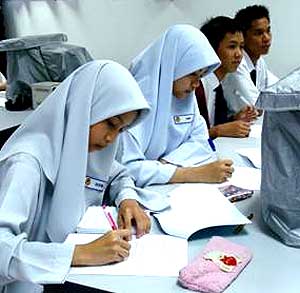
On his first day of school this year, Arman (not his real name) and his Standard Four classmates were asked by their English teacher if they had performed solat Subuh(morning prayers).
There were only a few hands up in the air.
"Tomorrow morning, anyone who did not perform solat Subuh can stay out of my class!" the teacher threatened them.
Arman came home upset. With English being the first lesson at school the next day, he felt apprehensive.
His parents tried to console him.
“If your teacher asks you the same question tomorrow, don’t be afraid. Just admit that you did not perform the prayers. And if he tells you to get out of the class, your mum and I will take it up with the headmistress,” said his father.
On the second day of school, Arman’s mother accompanied him to school to observe the English class. To her surprise, the English teacher repeated his question upon entering the classroom.
“Raise your hand if you have performed solat Subuh,” he instructed his Muslim students.
Arman felt his little tummy turning upside down. Although he did not do his morning prayers, fearing the consequences, he decided to lie and raise his hand.
Some other students who admitted to not having performed the morning prayers were then called by the teacher to the front of the class. They were then scolded and shamed in front of their classmates before being chased out to perform the solat in school.
Arman’s father, who I contacted regarding the incident, assured me that he was not going to sweep the matter under the carpet. According to him, although the majority of the students at the school are Malays, that does not justify the teachers behaving like preachers inside classrooms.
“We are getting an appointment with the headmistress tomorrow!” he said.
Is religion essential to learning?
Many people who I’ve spoken to believe that religion and the classroom are a toxic mix which should be avoided at all cost. These are some of their expressions:

“Classrooms are not for preaching. Students should not be required to pray when they should be learning how to speak good English.”
“A teacher’s job is to educate the students and not to strengthen their religion.”
“Students should be left to learn from their parents how to manage their own religion without having teachers telling them what to do.”
“Does the teacher ask his students if they had taken breakfast or if they had a good night’s sleep? These are better questions to ask, instead of asking if they had performed prayers.”
While it is easy to understand why discussions of religion make people uncomfortable, no matter where the discussions take place, I believe that discomfort is not a good enough reason to ban the topic altogether. In fact, with religion playing an important role in shaping our country’s identity, why should it be considered toxic at all?
I believe that religion needs to be taught in school, in a correct and acceptable way.
I believe addressing religion in schools is essential to learning, and can adequately provide students with a diverse connection to the world.
If students are going to function as members of society, they will need to learn basic religious facts and should be able to recognise the diversity that exists around them. In fact, religious literacy is key to a wholesome education, which will enhance the students’ education by teaching them more knowledge about different religions around the world.
We cannot deny the fact that students will be encountering different types of people throughout their lives, and they are going to need to know how to accept these differences, and not be judgmental. In addition to that, students from minority cultures and religious backgrounds need to feel included and accepted in their learning environment as well.
Many members of our society today are ignorant about the beliefs of others and form their own judgments about religion without being properly educated about it. Religion in schools can offer that education. Having open discussions on religion in classrooms can allow students to be open-minded and see things from a different view.

Discussions about why Muslims wear hijab; why Sikhs wear turban; or why Hindus have dots on their foreheads should be encouraged during these religion lessons in order to bring students of different religion closer, while encouraging acceptance of different religious beliefs and each other’s practices.
Yes, religion does have a place in school. In order to erase stereotypes and reduce ignorance, religion should be taught in schools.
Two different concepts
However, the school is not a place to promote religion. Mind you, there is a big difference between teaching religion and promoting religion.
While it is vital to expose our students to different religions and practices around the world and to encourage them to understand the concept of diversity in religion, what we do not need in our schools are teachers promoting religion and strengthening the faith of students.
We do not need teachers reminding students not to be too close to those not of the same religion as themselves. We do not need teachers separating students in classrooms based on their religion, even if it is to facilitate religious classes.
We do not need teachers pressuring students not to wear pinafores and demanding that they wear hijabs because of their religion. We do not need teachers telling students that some of their classmates will be going to hell because they belong to a different religion.
And we definitely do not need teachers investigating whether students have performed their prayers.
FA ABDUL is a passionate storyteller, a growing media trainer, an aspiring playwright, a regular director, a struggling producer, a self-acclaimed photographer, an expert Facebooker, a lazy blogger, a part-time queen and a full-time vainpot. - Mkini



No comments:
Post a Comment
Note: Only a member of this blog may post a comment.